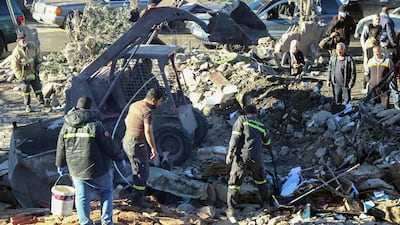Live updates: Follow the latest on Israel-Gaza
There is little left of the Douris Civil Defence centre, near Baalbek in Lebanon's eastern Bekaa Valley, that was hit by an Israeli air strike on Thursday night, killing 15 rescuers including its beloved leader Bilal Raad.
The regional centre was reduced to piles of rubble littered with helmets, firefighters’ uniforms and extinguishers on what was one of the deadliest days for the civil defence, with another four rescuers killed in an Israeli strike in south Lebanon.
Crumpled mattresses were strewn across the floor, a sign of the long hours the rescuers worked amid Israel's escalation of strikes on the Bekaa Valley that began last month.
Rescue workers from other centres were searching through the debris for the remains of their colleagues, visibly shocked and distressed after a sleepless night, when The National visited the site on Friday morning. “This is our 'weapon',” one said, holding up part of a firefighter's uniform.
“We never imagined we’d become a target,” said Geryos Mansour, from the nearby Ferzol Civil Defence centre. “Our work is well-known. We’re apolitical – we stand with humanity without distinction. We carry the international symbols of the civil defence.”
Most of the rescuers struggled to hold back their emotions. “We’ve been saving people for 50 days – who is going to save us now?” asked Hafez Ksas, a member of the Douris centre, his voice breaking as tears filled his eyes. “We were like a family – we saw each other more than our own children.”
Many, such as Haydar Al Afeh, another rescuer from the centre, were defiant. There was no hesitation when asked if he would continue working for the civil defence. “Of course,” he said. “They want to drive us out, but we’re staying. Would you leave your land?”
In the rubble, the civil defence workers had placed a firefighter's red helmet and jacket on top of a Lebanese flag, in tribute to their fallen colleagues. A handful stood alongside the flag and saluted.
Travelling towards Baalbek can feel like visiting the end of world these days. After weeks of intense Israeli attacks, the road leading in to the historical city is desolate, with only rescue workers and the Lebanese Army visible. Hundreds of the region's residents have been killed, while most of Baalbek's population has fled following Israeli eviction orders.
Israel has destroyed large parts of the city with strikes that it says are targeted at Hezbollah fighters and infrastructure. However, residents say the people killed and the buildings hit are civilian, much like the civil defence centre in Douris.
Human Rights Watch has denounced Israel's repeated attacks on emergency services as an apparent war crime. Ramzi Kaiss, Lebanon researcher at the NGO, said there has been a “very alarming pattern unfolding” of Israeli strikes targeting civil defence centres, paramedics' ambulances and hospitals.
“The number of paramedics killed continues to increase, frankly, at an appalling rate,” he said. More than 200 have been killed, most of them since mid-September. “There needs to be a serious investigation into these strikes, into violations of the laws of war. This is where the Lebanese government has a role to play.”
The Israeli military has not responded to The National's request for comment on the Douris attack and has not issued a statement explaining the strike's target.
Mona Harb, a professor at the American University of Beirut, said targeting civil defence centres is part of the Israeli strategy known as the Dahieh Doctrine, formulated during the previous war between Lebanese Shiite group Hezbollah and Israel in 2006. It involves the disproportionate use of force against civilian areas, with any Shiite-majority area such as the Bekaa Valley, perceived as a strongholds of Hezbollah, viewed as supposedly legitimate targets.
“The civil defence is one of the most basic forms of infrastructure. Targeting it is a way to destroy livelihoods, force people to leave, and prevent them from returning, as it signals that there are no more red lines,” she said. “Israel is applying a strategy of annihilation, urbicide and destruction, in complete violation of the principles of international humanitarian law.”
'Truly the best of us'
Bilal Raad, the head of the regional civil defence centre in Douris who was killed in Thursday's attack, had spoken to The National just two weeks earlier about the perils of rescue work amid incessant attacks by the Israeli military.
A veteran fireman and father of a two-year-old child, he was well-known and respected among first responders in the region. “He never missed a single mission. Every strike, he was there. He was truly the best of us,” said Ata Mansour, a paramedic with the Al Chifa organisation.
Mr Mansour said he worked alongside Mr Raad in the team that rescued a two-month-old baby from the rubble of an Israeli strike in a nearby village two weeks earlier. The baby is now stable at Dar Al Amal Hospital in Douris. “That’s what keeps us going, that’s the motivation,” he said.
When The National met Mr Raad, his team was sitting outside, smoking shisha in between missions, as he described the challenges the civil defence faced on top of working in a war zone war, with resources limited by the country's economic crisis. He gave the example of rescue missions where his team had to pull dead children from the rubble with their bare hands.
“We're doing rescue missions under the constant sound of Israeli jets and drones, of course, we're not immune to fear, but when we go back to our centre that's when we feel safe,” he said. “We consider it's our safe space, but you never know, maybe they will hit it, Israel doesn't distinguish between its targets.”








